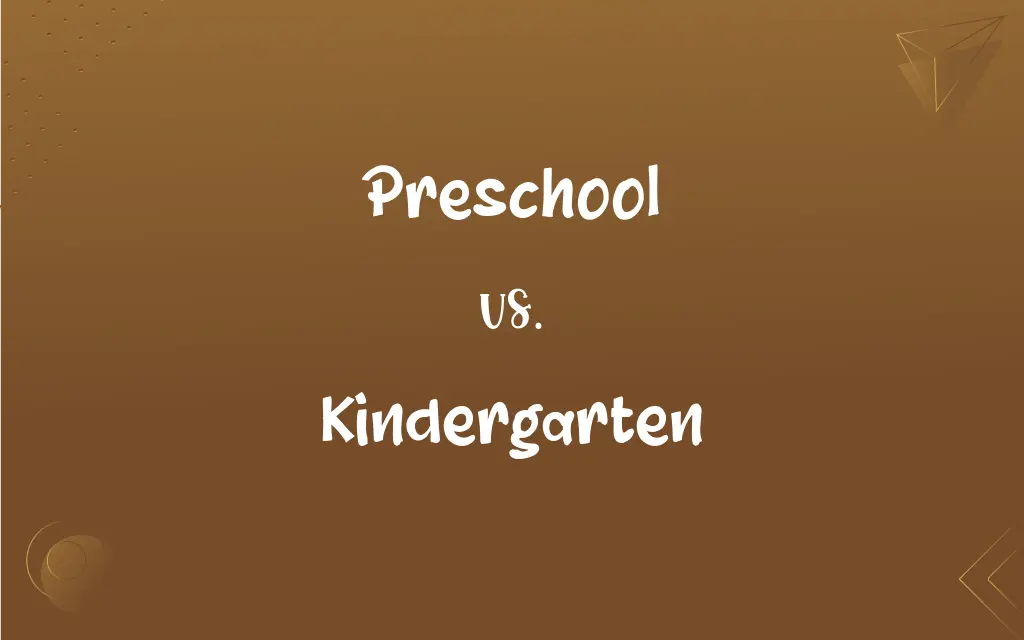Preschool vs. Kindergarten: What's the Difference?
Edited by Janet White || By Harlon Moss || Updated on October 4, 2023
"Preschool" is for children typically aged 2-5 and focuses on play-based learning; "kindergarten" is for children around ages 5-6 and is a more formal introduction to elementary education.

Key Differences
"Preschool" and "kindergarten" are foundational stages in a child's educational journey. Preschool primarily serves younger children, often between the ages of 2 and 5. Its curriculum is play-based, nurturing children's curiosity and creativity. On the other hand, kindergarten caters to children around the ages of 5 to 6 and is a stepping stone to formal education, emphasizing foundational academic skills.
In terms of structure, preschool is less formal than kindergarten. While preschool promotes social interactions, emotional development, and motor skills through free play and guided activities, kindergarten introduces a structured learning environment with a balance of play and academics. Teachers in kindergarten often start teaching basic math, reading, and writing.
Another distinction is the duration. Preschools can be part-time, with children attending a few hours a day or a few days a week. In contrast, kindergarten is usually a full school day, preparing children for the regular school schedule they'll experience in later grades.
Admission criteria also vary. Preschools might not have stringent age requirements, and children can join based on their developmental readiness. Kindergartens, however, typically require children to be of a certain age by a specific cutoff date to enroll.
Lastly, while both are foundational, the goals differ slightly. Preschool aims to foster a love for learning, social skills, and emotional growth. Kindergarten, while also focusing on these aspects, places more emphasis on academic readiness for the subsequent school years.
ADVERTISEMENT
Comparison Chart
Age Group
Typically 2-5 years old
Typically 5-6 years old
Focus
Play-based learning
Introduction to formal education
Structure
Less formal
More structured
Duration
Can be part-time
Usually full-time
Goals
Social skills, emotional growth, love for learning
Academic readiness, social skills, emotional development
ADVERTISEMENT
Preschool and Kindergarten Definitions
Preschool
Preschool can be part-time or full-time.
The preschool offers both morning and full-day sessions.
Kindergarten
Kindergarten is the transition phase between preschool and elementary school.
He's excited to start kindergarten next fall.
Preschool
Preschool prepares children for kindergarten.
Her preschool focuses on readiness skills for kindergarten.
Kindergarten
Kindergarten usually serves children around 5-6 years old.
Children in the US typically start kindergarten at age 5.
Preschool
Preschool focuses on play-based learning experiences.
The preschool emphasizes hands-on activities.
Kindergarten
Kindergarten has a structured learning environment.
Her kindergarten has set times for reading, play, and nap.
Preschool
Preschool is an early childhood program for young kids.
She attends a local preschool three days a week.
Kindergarten
Kindergarten introduces children to formal education concepts.
In kindergarten, she learned basic math and reading.
Preschool
Preschool aids in social and emotional development.
At preschool, he learned to share and make friends.
Kindergarten
Kindergarten emphasizes academic readiness.
The goal of kindergarten is to prepare kids for first grade.
Preschool
Of, relating to, intended for, or being the early years of childhood that precede the beginning of elementary school.
Kindergarten
A program or class for four-year-old to six-year-old children that serves as an introduction to school.
Preschool
A school for children who are not old enough to attend kindergarten; a nursery school.
Kindergarten
An educational institution for young children, usually between ages 4 and 6; nursery school.
Preschool
Of or relating to the years of early childhood before attendance at primary school.
Kindergarten
The elementary school grade before first grade.
Preschool
A nursery school.
FAQs
How long is a typical preschool day?
Preschool can vary from a few hours a day to full-day programs.
Are preschools affiliated with elementary schools?
Some preschools are standalone, while others are part of larger institutions that include elementary grades.
What's the main goal of kindergarten?
Kindergarten aims to prepare children academically and socially for subsequent school years.
What subjects are introduced in kindergarten?
Kindergarten covers basic subjects like math, reading, writing, science, and social studies.
How is discipline managed in kindergarten?
Kindergartens employ positive discipline strategies, focusing on redirection, communication, and teaching appropriate behaviors.
Is homework common in kindergarten?
It varies by school, but some kindergartens may give light homework or activities.
Do preschools have a set curriculum?
While more flexible than higher grades, many preschools follow specific curricular guidelines for early learning.
Can children skip preschool and start with kindergarten?
Yes, while preschool can be beneficial, it's not mandatory, and some children directly start with kindergarten.
How do kindergartens assess progress?
Through observations, portfolios, and sometimes informal assessments to gauge academic and social development.
Do kindergarteners have recess or playtime?
Yes, playtime or recess is typically incorporated into the kindergarten day for physical activity and socialization.
Is kindergarten a part of elementary education?
Yes, kindergarten is considered the initial stage of formal elementary education.
Do kindergarteners learn to read and write?
Yes, kindergarten introduces basic reading and writing skills.
Do children nap in preschool?
Many preschools have a designated nap or rest time, especially for younger attendees.
Are preschool teachers certified?
Requirements vary, but many preschool teachers have specific early childhood education certifications.
How do preschools handle children with special needs?
Many preschools have inclusive programs and work with specialists to support children with special needs.
What skills should children have before starting kindergarten?
Basic skills like recognizing letters, counting, holding a pencil, and following simple instructions can be beneficial.
What age group typically attends preschool?
Preschool usually serves children between the ages of 2 and 5.
What's the primary focus of preschool?
Preschool primarily focuses on play-based learning and social and emotional development.
Is kindergarten attendance mandatory?
It varies by state; in some US states, kindergarten attendance is mandatory, while in others it's optional.
Are there academic lessons in preschool?
While the focus is on play, many preschools incorporate basic academic concepts through interactive activities.
About Author
Written by
Harlon MossHarlon is a seasoned quality moderator and accomplished content writer for Difference Wiki. An alumnus of the prestigious University of California, he earned his degree in Computer Science. Leveraging his academic background, Harlon brings a meticulous and informed perspective to his work, ensuring content accuracy and excellence.
Edited by
Janet WhiteJanet White has been an esteemed writer and blogger for Difference Wiki. Holding a Master's degree in Science and Medical Journalism from the prestigious Boston University, she has consistently demonstrated her expertise and passion for her field. When she's not immersed in her work, Janet relishes her time exercising, delving into a good book, and cherishing moments with friends and family.































































